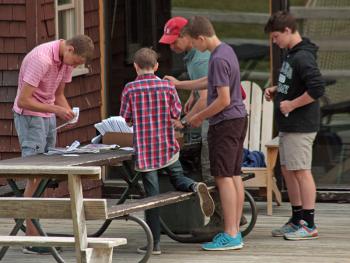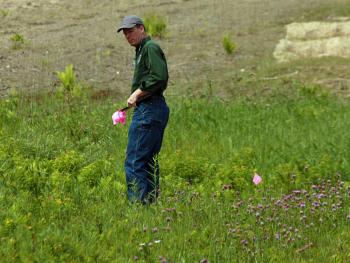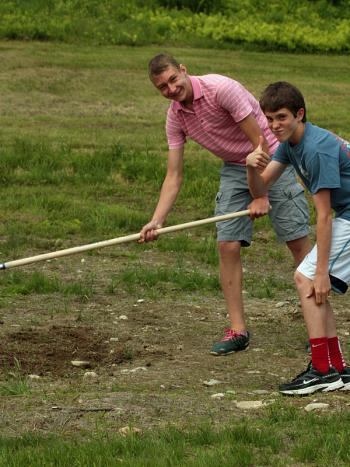Camden-Rockport eighth-graders spread hope for pollinators at the Snow Bowl
2541.jpg)
CAMDEN — The 2014-2015 school year is winding down around the Midocast, and as they have for a number of years, eighth-graders at Camden-Rockport Middle School are spending the day before their last day as middle school students on community service projects.
Seventh- and eighth-grade Spanish teacher Aaron Henderson, who is also an eighth-grade homeroom teacher, spent Thursday morning at the Camden Snow Bowl with one group of eighth-graders. Their project was to spread a special mix of flower seeds that will attract pollinators, such as honeybees, native bees and butterflies.
The seeds, furnished and donated by Burpee, are part of President Barack Obama's National Pollinator Initiative. This week is Pollinator Week, from June 15-21. Last year, Obama directed all federal agencies to assist in pollinator conservation to protect the health of the nation's food security, and to keep bees, butterflies and birds flying.
The president's Initiative is also committed to sustaining the future of pollinators through research, policy, education and action, according to the seed program's literature.
Snow Bowl Manager Landon Fake worked through a few biology and math questions with the students, including how to estimate what 100-squre-feet looks like, and then the kids headed out with seed packets in hand.
Included in the packets were 3 grams of seed mix of perennials including sunflower, lupine, cosmos, zinnia, Echinacea, flax, calendula, baby's breath, California poppy, blue tansy, Indian blanket, coneflower, orange milkweed, rose milkweed, black-eyed Susan, coreopsis, delphinium, lobularia, wild bergamot or bee balm, and New England aster.
After spreading the seeds over a 100-square-foot area per packet, the students then went over the seed-covered ground with a rake to scratch the surface and cover the seeds.
"It's a perfect day to do this, because we are supposed to get some rain tonight and then again tomorrow night," said Fake to the group.
Henderson said that each year, the eighth-graders work in small groups on the various community service projects in the morning, followed by a field day, and then there is a dance at the Yacht Club that evening.
In addition to the seed planting project at the Snow Bowl, CRMS eighth-graders Thursday were involved in cage cleaning at P.A.W.S. Animal Adoption Center, where they also likely got to spend some quality time with the pets; grounds work at the Montessori School, Rockport Library and Coastal Workshop; trail work on Beech Hill Preserve; playing games with the senior residents at 63 Washington Street and Windward Gardens, as well as with students at People Place Cooperative School; and building a dugout at the baseball field with members of Habitat for Humanity.
"This year's end-of-year activities have been very well organized," said Henderson.
Friday, June 19 is the official last day of school at CRMS this year, and for the eighth-graders, who will participate in a promotion in the morning, they will be moving on to high school in the fall.
Presidential Memorandum — Creating a Federal Strategy to Promote the Health of Honey Bees and Other Pollinators
MEMORANDUM FOR HEADS OF EXECUTIVE DEPARTMENTS AND AGENCIES
SUBJECT: Creating a Federal Strategy to Promote the Health of Honey Bees and Other Pollinators
Pollinators contribute substantially to the economy of the United States and are vital to keeping fruits, nuts, and vegetables in our diets. Honey bee pollination alone adds more than $15 billion in value to agricultural crops each year in the United States. Over the past few decades, there has been a significant loss of pollinators, including honey bees, native bees, birds, bats, and butterflies, from the environment. The problem is serious and requires immediate attention to ensure the sustainability of our food production systems, avoid additional economic impact on the agricultural sector, and protect the health of the environment.
Pollinator losses have been severe. The number of migrating Monarch butterflies sank to the lowest recorded population level in 2013-14, and there is an imminent risk of failed migration. The continued loss of commercial honey bee colonies poses a threat to the economic stability of commercial beekeeping and pollination operations in the United States, which could have profound implications for agriculture and food. Severe yearly declines create concern that bee colony losses could reach a point from which the commercial pollination industry would not be able to adequately recover. The loss of native bees, which also play a key role in pollination of crops, is much less studied, but many native bee species are believed to be in decline. Scientists believe that bee losses are likely caused by a combination of stressors, including poor bee nutrition, loss of forage lands, parasites, pathogens, lack of genetic diversity, and exposure to pesticides.
Given the breadth, severity, and persistence of pollinator losses, it is critical to expand Federal efforts and take new steps to reverse pollinator losses and help restore populations to healthy levels. These steps should include the development of new public-private partnerships and increased citizen engagement. Therefore, by the authority vested in me as President by the Constitution and the laws of the United States of America, I hereby direct the following:
Section 1. Establishing the Pollinator Health Task Force. There is hereby established the Pollinator Health Task Force (Task Force), to be co-chaired by the Secretary of Agriculture and the Administrator of the Environmental Protection Agency....BARACK OBAMA. READ THE ENTIRE MEMORANDUM HERE...
Related links:
• National Park Service: Pollinators
Reach Editorial Director Holly S. Edwards at hollyedwards@penbaypilot.com and 706-6655.






























